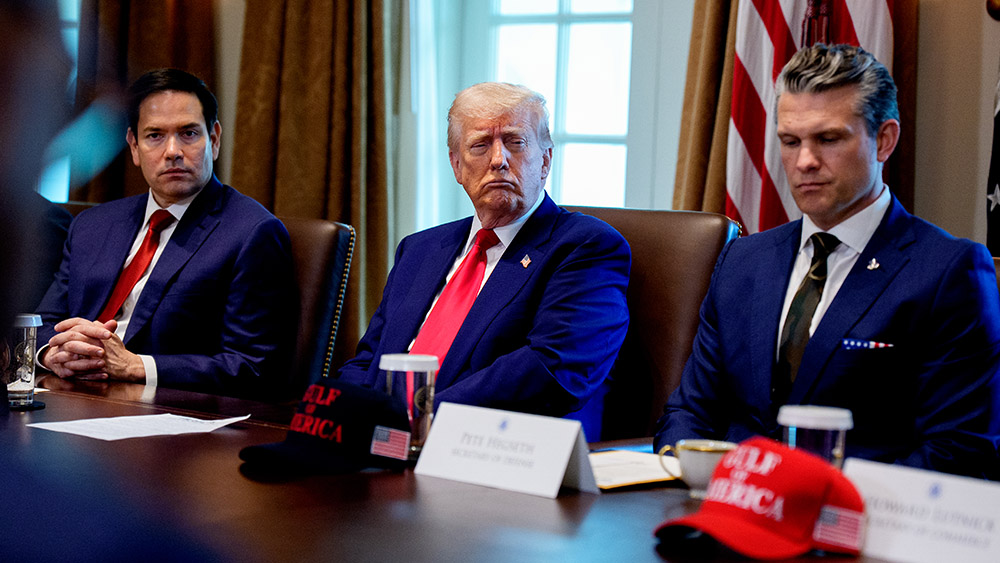Trump urges swift crypto bill passage as Senate-backed GENIUS Act heads to House
06/23/2025 / By Willow Tohi

- President Donald Trump demands swift House passage of the Senate-approved GENIUS Act, aiming to position the U.S. as a global leader in crypto and digital assets.
- The GENIUS Act establishes regulatory frameworks for stablecoins and private issuance of digital dollars, with Treasury Secretary Scott Bessent predicting economic benefits like reduced borrowing costs.
- U.S. leadership in digital assets is framed as critical to countering global competitors and bolstering economic stability amid geopolitical rivalries.
- Critics warn of regulatory risks and uneven international adoption, but supporters cite parallels to past American tech-driven recoveries.
- The legislation could lower national debt through stablecoin demand for U.S. Treasuries and accelerate the global shift to digital currencies.
President Donald Trump on Wednesday called for the House to speedily approve the GENIUS Act, a Senate-passed bill aimed at establishing U.S. dominance in cryptocurrency and digital asset innovation. The Senate approved the measure in a 68-30 vote on Tuesday, but Trump urged lawmakers to prioritize its passage without amendments, calling it a “win-win-win” for the economy while affirming American leadership in global markets. “Digital Assets are the future, and our nation is going to own it,” Trump declared on his social platform Truth Social, emphasizing urgency with the phrase: “Get it to my desk, ASAP.”
The bill arrives amid heightened international competition in crypto regulation, with China, El Salvador and the EU accelerating their own digital currency initiatives. Key provisions include guidelines for stablecoins—a $3.7 trillion market by 2030—allowing private companies to issue dollar-backed digital currency and fostering U.S. control over an emerging global payment system.
Economic blueprint: Treasury officials highlight “brilliance” of crypto expansion
Treasury Secretary Scott Bessent, a vocal advocate of the bill, frames the GENIUS Act as a trio of gains for U.S. financial security: lower borrowing costs, reduced national debt and expanded global influence. “A thriving stablecoin ecosystem will drive demand for U.S. Treasuries, lowering government borrowing costs in a precedent-setting win for fiscal responsibility,” Bessent argued, citing projections that stablecoin growth could reduce interest expenses by billions annually.
The secretary also emphasized consumer accessibility, noting the bill’s role in onboarding “millions of new users” abroad to a dollar-centric digital economy. “This isn’t just about Silicon Valley—it’s about ensuring the greenback remains the world’s reserve currency in an increasingly digital future,” Bessent added, evokinghistorical parallels to the 20th century’s tech-driven economic surges.
Historic stakes: Balancing innovation and risk in a volatile crypto landscape
The GENIUS Act represents a pivot from decade-long uncertainty in crypto regulation. Unlike the 2020 Lummum bill, which stalled amid partisan gridlock, the bipartisan appeal of the Senate’s version reflects growing recognition of crypto’s inevitability. Opponents, however, warn of untested risks. Former Fed Chair Jerome Powell cautioned in Senate testimony last week that “overregulation stifles innovation, but underregulation could compound systemic risks after crises like FTX’s collapse.”
Yet proponents argue that clarity now will solidify U.S. leadership before rivals surge ahead. “Right now, China and Russia are weaponizing digital currencies for geostrategic influence,” said Rep. Diane McKinnon, a Republican cosponsor of the bill. “If we wait, we’ll miss the next economic frontier.”
From sovereign individuals to global markets: The quiet revolution in finance
The debate transcends partisan politics, echoing themes of decentralized finance and economic autonomy outlined in The Sovereign Individual—a 1990s economic manifesto predicting digital gold economies. Today’s activists, including cryptocurrency advocates, argue that tools like stablecoins empower individuals to bypass traditional systems susceptible to inflation and authoritarian control.
“For millennials and Gen Z, cash is already obsolete,” said tech ethicist Lena Torres, while financial analysts at Goldman Sachs estimate the crypto economy could represent 10% of global GDP by 2030. “The GENIUS Act isn’t just about tech—it’s about who controls the future’s transaction networks,” Torres added.
A new economic chapter, but questions remain
As the House gears up for a vote this summer, the GENIUS Act’s success hinges on balancing innovation with regulatory rigor. Trump’s insistence on a “clean” bill—free of amendments—may clash with House Democrats seeking consumer protections. Meanwhile, foreign governments and crypto exchanges await clarity on whether the U.S. will seize the moment or cede ground to rivals.
For now, supporters urge action. “The economic stakes couldn’t be higher,” Bessent warned. “This bill isn’t just legislation—it’s a reset button for the dollar’s global supremacy.”
The clock is ticking for Congress.
Digital dollars or domestic debt?
The GENIUS Act represents both promise and peril for a post-pandemic U.S. economy. As the world grapples with debt-fueled crises and digital transformation, the bill offers a rare consensus bill to align innovation, security and fiscal health. Whether it becomes a blueprint for revival or a cautionary tale on hasty legislation may define the next decade’s economic landscape—and by extension, the sovereignty of its citizens in an interconnected world.
Sources for this article include:
Submit a correction >>
Tagged Under:
big government, crypto, digital dominance, dollar demise, economy, fiance, finance, glitch, government debt, money supply, risk, Trump
This article may contain statements that reflect the opinion of the author
Get independent news alerts on natural cures, food lab tests, cannabis medicine, science, robotics, drones, privacy and more from NewsTarget.com
Get independent news alerts on natural cures, food lab tests, cannabis medicine, science, robotics, drones, privacy and more from NewsTarget.com
RECENT NEWS & ARTICLES
COPYRIGHT © 2017 DEBT COLLAPSE NEWS




















